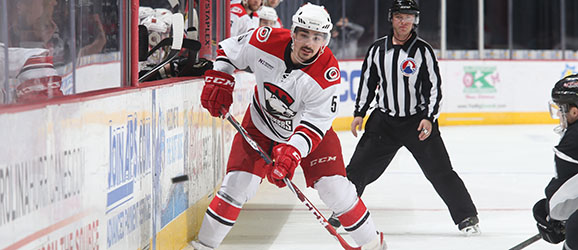All the 20-year-old did in his first professional season was set franchise records for games played (all 76), goals (seven), assists (25), points (32), power-play assists (13) and power-play points (14) by a rookie defenseman. His 94 penalty minutes were the most ever by a first-year Checker at any position.

“He played like a veteran this year,” said Jeff Daniels, his coach in Charlotte this past season. “We had this conversation a year ago about Danny Biega. You’re not really sure what’s going to happen in his first year and if he’s going to adapt right away or not, but he stepped up and filled a big role with playing power play and playing big minutes and bringing a physical edge to get some respect in the league.”
On a team starved for offense all season, Carrick ended up ranking third on the team in scoring behind experienced forwards Justin Shugg and Chad LaRose thanks to a particularly prolific month of March that saw him score 12 points (2g, 10a) in just 13 games. His season finished with an exclamation point as he tied a franchise record with four assists in the season finale at Grand Rapids on April 18.
Carrick’s scoring pace put him in good standing around the league as well, as he ranked second among AHL rookie defensemen in assists and tied for second among all rookies in power-play assists.
Coming off a 51-point season of junior hockey with Mississauga and Sudbury of the Ontario Hockey League, Carrick’s late season spike in production could simply be a result of feeling as though he belonged.
“Over the season you get a little more confident and feel a little more comfortable out there,” said Carrick, Carolina’s fourth-round pick in 2012. “I didn’t really change much. It was just kind of getting the lucky bounces and they were finding their way in the back of the net.”
Of course, his sense of belonging could also have been reinforced by the fact that he was one of a team-record six rookies that spent the majority of the season with the Checkers – another factor in his perhaps greater-than-expected amount of playing time. On the last home game of the season on April 12, once junior hockey tryouts had joined up, he was one of five rookie defensemen playing in front of a rookie goalie. Rookies accounted for three of the Checkers’ four goals in that day’s win.
“I love playing with Trevor,” said Biega, the only non-rookie in the lineup that particular day. “He had a great year and he’s a phenomenal player. You see his development from the start of the year to now, he played a ton of minutes and he played in every single important situation. It really benefited him positively at the end of the year. I think he’s going to have a great career ahead of him.”
“We had a young team this year so the coaches gave me every opportunity that I could ask for,” said Carrick. “I just tried to take full advantage of it. When there’s only one or two veteran D in the lineup you don’t really feel like a rookie out there.”

“They’re changing a little bit in the sense that there’s no need to rush a young guy unless he’s really proven that he’s too good for this league, and then you give him a chance,” said Daniels, who had been with the franchise in some capacity since joining as a player in 1999. “The mindset now is that when they go up they go up to stay.”
Of the Checkers’ six rookies, only Patrick Brown played NHL games after briefly making the team out of training camp. Carrick’s roommate Brock McGinn is another that may have received an opportunity in previous seasons.
“With Trevor and Brock and Phil (Di Giuseppe) and those guys, there’s no pressure,” said Daniels. “Just go out and play your game and if you get a chance great, but the focus was that they were down here to play and learn the pro game. As long as they get better every day. If you look from game one to the last game, those guys made some big steps.”
Seemingly ahead of the curve to begin his pro career, Carrick hopes to continue to make steps in the offseason.
“I think they were pretty happy with my year,” he said, relaying feedback from Checkers coaches and Hurricanes management at his exit meeting. “They just told me to hit the gym this summer and get a lot bigger and stronger. I won’t be a rookie next year and I’ll have more of a role.”






